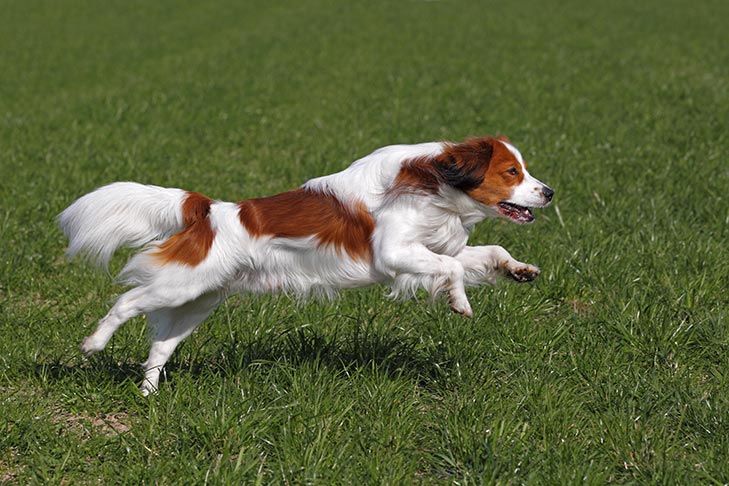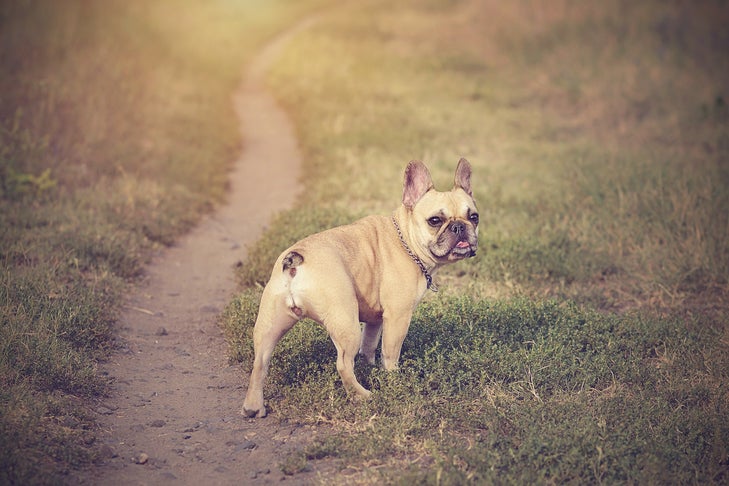Give a dog a sniff of freedom and there’s a good chance they’ll run for it and end up lost.
It can happen in the blink of an eye. Picture this: The doorbell rings. It’s the busy season with lots of deliveries coming and going. You’ve told your kids to keep your escape artist dog restrained when you open the door. But they forget, and the next time you accept a package, you feel a furry brush against your leg. Next thing you know, the dog has sprinted down the street and ends up lost out of sight.
Perhaps your home is the one where all your kids’ friends hang out. Or the spot where the poker game or book club takes place. But not everyone who visits knows pet etiquette. Some waltz in and leave the front door hanging open. You try your hardest to ensure everyone closes the door after guests enter. But, suddenly you notice your dog is lost and you don’t know where they’ve gone.
Conversely, there’s the scenario when you let your dog out into a fenced yard where the kids are playing. Minutes later, you open the door, but your dog is nowhere to be found. The gate is swinging, and no one in the family will admit to opening it. You search the yard and street, but your dog seems to be lost. Regardless of who’s responsible, a lost dog can take a toll on your relationship if not handled the right way.
The Lost Dog Blame Game
Your dog is part of your family. So it’s only natural that if they go missing, the fear, panic, and grief you feel will be like losing any other family member. But, because dogs are so dependent on humans, there may likely be an additional component: guilt.

One of your first emotions upon learning your dog is lost will likely be anger directed at the person you consider responsible. Anger, after all, is easier to deal with than fear. However, that anger almost immediately will turn into blame.
“You can’t keep blame from happening,” says Dr. Joel Gavriele-Gold, a clinical psychologist with a private practice in New York City, and the author of When Pets Come Between Partners. “But, try not to make accusations in the heat and terror of the moment.”
First Steps
Harsh words can fracture a fragile human relationship, making it difficult to repair later. Instead, focus on the dog’s well-being and react proactively. First, search the neighborhood. Your dog may not have gone far. Call their name and try using a favorite food to lure your pup out from hiding spots. Knock on doors, alert the neighbors, and try posting current pictures of your pup on internet forums and social media. A good Samaritan may already have the lost dog in their possession while looking for the owner.
Dogs who are chronic runners can cover lots of ground in a short space of time. So if you know your dog is a swift, free spirit, divide and conquer. Have a family member or friend call animal control with a description while you visit shelters within a 60-mile radius. Make flyers that you can post in local markets and shops. Work together as a family to locate the lost dog.
“Deal with it. Discuss it. Understand it,” says Dr. Gavriele-Gold of the process. “Like any other [tense] situation, painful things can be said at the time. You need a family or couples’ powwow to address lingering resentments.”
Consider the Possibilities of a Lost Dog
Some owners remove their dogs’ collars (including ID tags) when they’re in the house, and only put them on for walks. If this is the case, and the dog is not microchipped and registered with a national recovery service like AKC Reunite, consider the sad fact that the dog could be lost for good.
How the couple or family moves on from such loss depends on what the dynamics were like before the incident, according to Dr. Gavriele-Gold. Healthy relationships can generally weather these types of situations better than ones that were already in distress. But, even good relationships can suffer from the hurt and intimidation that result from the moment of loss.
“It’s human nature,” he notes.
Of course, the family member responsible could feel an enormous amount of guilt that can result in depression. That also affects the couple or family dynamic, which is already stressed by grief.
“These feelings have to be resolved,” recommends Dr. Gavriele-Gold. “If the family can’t get past it, then consider seeing someone.”

Results and (Dis)Solutions
Dr. Gavriele-Gold confirms that he has witnessed couples breaking up over a lost dog. But he stresses, again, that if such a dissolution occurs, it’s probably due in part to other factors.
“This is basically my theme song,” he says. “Mostly, it’s not about the dog. It’s about what’s going on with the couple or family before the incident occurred.”
Just as the loss of a dog (or any traumatic event) could reveal the cracks in a relationship, finding the dog won’t necessarily heal them. So, even if you do locate your dog after it was lost, make sure to talk about what happened, and how you handled it, in a reasonable and calm manner, so that it doesn’t occur again.
‘No Bones About It’ is a monthly relationship column about the ways dogs impact human connections. Dr. Gavriele-Gold’s latest book on dog-human relationships, When Pets Come Between Partners, is now available on Amazon. He also hosts a monthly “Comfort Conversation” on grief on the AKC Pet Loss Support Group on Facebook.

